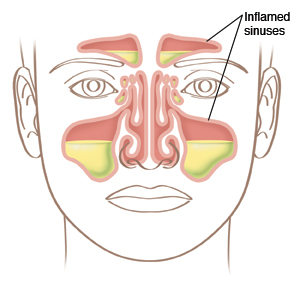Sinus Headache

The sinuses are air-filled spaces in the bones of the face. They connect to the inside of the nose. Sinusitis is an inflammation of the tissue lining the sinus cavities. Sinus inflammation can occur during a cold or an attack of hay fever (allergies to pollens and other particles in the air). It can cause symptoms of sinus congestion and fullness and perhaps a low-grade fever. An infection is often present when there is also facial pain or headache and green or yellow drainage from the nose or into the back of the throat (postnasal drip). Antibiotics may be prescribed to treat this condition.
Sinus headaches may cause pain in different places, depending on which sinuses are infected. There may be pain in the temples, forehead, top of the head, behind or around the eye, across the cheekbone, or into the upper teeth.
You may find that changing your position will bring some relief. Try sitting upright or lying down.
Home care
These guidelines will help you care for yourself at home:
-
Drink plenty of water, hot tea, and other liquids to stay well hydrated. This thins the mucus and helps your sinuses drain.
-
Apply heat to the painful areas of the face. Use a towel soaked in warm water. Or stand in the shower with the warm spray on your face. This is a good way to breathe in warm water vapor and get heat on your face at the same time. Cover your mouth and nose with your hands so you can still breathe as you do this.
-
Use a cool mist vaporizer at night. Suck on peppermint, menthol, or eucalyptus hard candies during the day.
-
An over-the-counter expectorant containing guaifenesin helps thin the mucus. It may also help your sinuses drain.
-
You may use over-the-counter decongestants unless a similar medicine is prescribed. Nasal sprays or drops work the fastest. Use one that contains phenylephrine or oxymetazoline. First blow your nose gently to remove mucus. Then apply the spray or drops. Don't use decongestant nasal sprays or drops more often than the label says or for more than 3 days. This can make symptoms worse over time. Nasal sprays or drops prescribed by your health care provider typically don't have these limits. Check with your provider or pharmacist.
-
You may also use tablets that have pseudoephedrine. Side effects from oral decongestants tend to be worse than with nasal sprays or drops. They may keep you from using them. Many sinus remedies combine ingredients, which may increase side effects. And if you're taking a combination medicine with another medicine, be sure you aren't taking a double dose of anything by mistake. Read the labels or ask the pharmacist for help. Talk with your provider before using decongestants if you have high blood pressure, heart disease, glaucoma, or prostate trouble.
-
Antihistamines may help if allergies are causing your sinusitis. You can get chlorpheniramine and diphenhydramine over the counter, but they can make you drowsy. Don't use them if you have glaucoma or if you are having trouble urinating due to an enlarged prostate. Over-the-counter antihistamines containing loratadine, fexofenadine, and cetirizine may cause less drowsiness. They may be a better choice for daytime use.
-
When allergies cause your sinusitis, a saline nasal rinse may give relief. A saline nasal rinse reduces swelling and clears excess mucus. It lets the sinuses drain. Packaged kits are sold at most pharmacies. They contain premixed salt packets and an irrigation device. If antibiotics have been prescribed to treat an acute sinus infection, talk with your provider before using a nasal rinse. This is to be sure it is safe for you.
-
You may use over-the-counter medicine to control pain and fever unless another pain medicine is prescribed. Talk with your provider before using acetaminophen or ibuprofen if you have chronic liver or kidney disease. Also talk with your provider if you've ever had a stomach ulcer or are taking any blood thinners. Don't give aspirin to children or teens unless your child’s doctor says it is safe. Aspirin can put your child at risk for Reye syndrome, a rare but serious condition.
-
If your doctor prescribed antibiotics, take them as directed. Do not stop taking them just because you feel better. You need to take the full course of antibiotics.
Follow-up care
Follow up with your provider as advised, or if your symptoms aren't better in 1 week.
Call 911
Call 911 if:
-
You have abnormal drowsiness or confusion.
-
You have swelling of the forehead or eyelids.
-
You have vision problems, including blurred or double vision.
-
You have a seizure.
-
You have a feeling of doom.
-
You have trouble breathing.
-
You feel dizzy.
-
You faint or lose consciousness.
When to contact your doctor
Contact your provider right away if:
-
Your facial pain or headache becomes worse.
-
You have a stiff neck.
-
You have a fever of 100.4ºF (38ºC) or higher, or as advised by your provider.
-
You bleed from the nose or throat.
Online Medical Reviewer:
Daphne Pierce-Smith RN MSN
Online Medical Reviewer:
Melinda Murray Ratini DO
Online Medical Reviewer:
Sravani Chintapalli Researcher
Date Last Reviewed:
4/1/2025
© 2000-2025 The StayWell Company, LLC. All rights reserved. This information is not intended as a substitute for professional medical care. Always follow your healthcare professional's instructions.